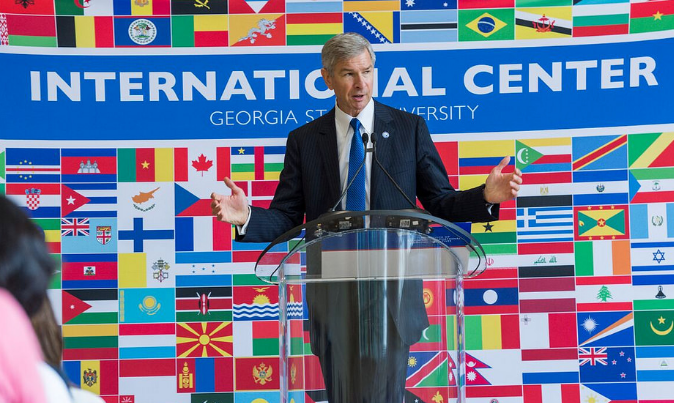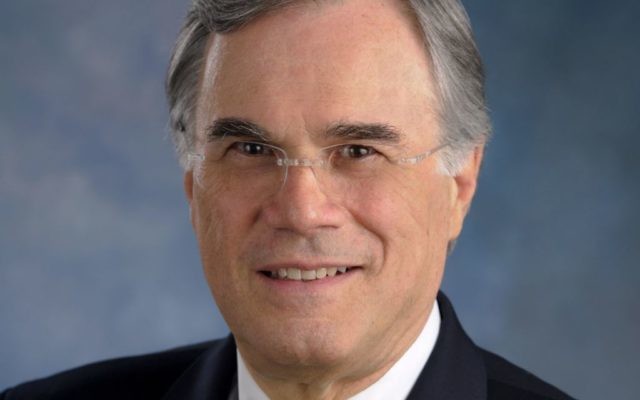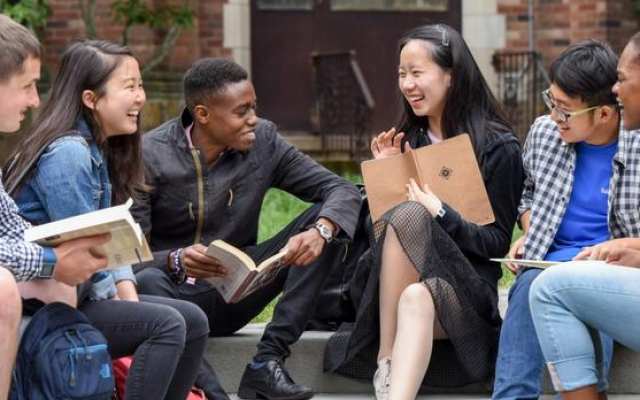U.S. Sees Decline in International Student Enrollment
Georgia State University President , Mark Becker, participated earlier this month in GSU’s World Affairs Council, where he discussed the role of education in international affairs.
When the president of Georgia State University, Mark Becker, participated earlier this month in GSU’s World Affairs Council, he reaffirmed how important education has been as a driving force in international affairs.
Last December, Becker made his first visit to Israel. Although that trip was sponsored by Project Interchange, the nonprofit educational institute of the American Jewish Committee, he was careful to balance his admiration of Israeli higher education and scientific prowess with a concern for the deep political chasm between Israel and the Palestinians.
“Diversity,” he was quoted in Georgia State’s student newspaper at the time, “is a main topic of conversation.”
International education, once seen as a prime avenue to foster understanding between the nations of the world,+ has, in recent years, become a contentious and emotionally charged political battlefield.
Kirsty Williams, the minister of education in Wales, U.K., met with Becker at the World Affairs Council program Sept. 6 on “Innovating International Education.”
“It is more important than ever to show the world that we are not sufficient in education; that we will not turn our back on the world.”
In late August, a foreign student from Lebanon who had been awarded a scholarship to study at Harvard University, was barred by immigration officials from entering the United States to begin his studies. Even though he had been issued a visa to study in this country, when he landed in Boston, immigration officers searched his laptop and phone and found what they described as comments made by some of his friends that were hostile to American policy decisions. They sent him back to Lebanon.
After much publicity and lengthy discussions in Washington, D.C., he was allowed to come back to Boston and began his studies earlier this month.

Incidents like this are blamed, in part, for the decreasing numbers of foreign students coming to the United States for their college education over the past several years. According to the Institute of International Education, new foreign student enrollment in the United States fell by 6.6 percent in 2017-18, which was double the drop from the previous year. While the total number of international students in the U.S. grew slightly in those years, the drop in new enrollees is said to be the biggest since the terrorist attacks of 9/11 in 2001.
In the last 20 years, according to The Economist magazine, the number of international students has more than doubled and will double again by 2025, from 2 million in 2000 to 7 to 8 million in the next five years. As America has lost foreign students, countries such as Australia, China and Canada have gained them.
And there are new players in the marketplace. Japan has a goal of 300,000 students by 2020, which is 60 percent more than just four years ago. And Malaysia is hoping to have 250,000 foreign students attending their universities by 2025.
In recent years in America, foreign students have helped to pad education budgets and subsidize local students. The latest analysis by NAFSA, the Association of International Educators, shows that the nearly 1.1 million international students studying at U.S. colleges and universities contributed $39 billion and supported more than 455,000 jobs to the U.S. economy during the 2017–2018 academic year.
According to a survey released in May of this year by NAFSA: “a significant proportion of institutions report that the U.S. social and political environment (60%) and feeling unwelcome in the United States (48.9%) are factors contributing to new international student declines.”
Rachel Banks, the public policy director of NAFSA, confirms that the decrease appears to be continuing.

But it’s not just the policies of the federal government that are affecting international educational exchanges. In April, Georgia State’s student government interjected itself in that conversation by attempting to end the university’s participation in a long-standing international educational exchange program between law enforcement officers in Israel and Georgia. The measure was decisively tabled but could be brought up again this fall when the student government reconvenes.
Robbie Friedmann, a retired professor of criminal justice who has run the Georgia International Law Enforcement Exchange program since 1992, has noted that pressure to end the program has increased in the last 10 years, but so far the president of GSU has refused.
The hope is that the insights Becker has gained from last year’s trip to Israel will help to fend off future attempts to shut the program down.




comments